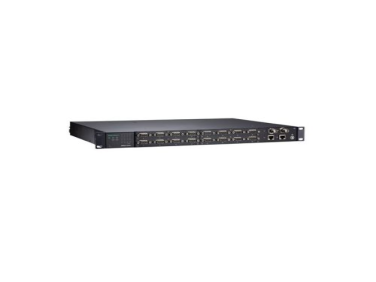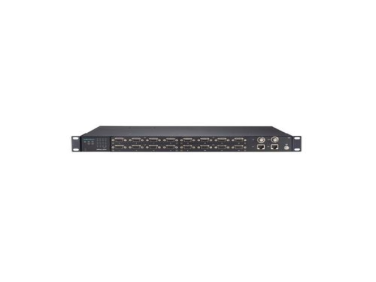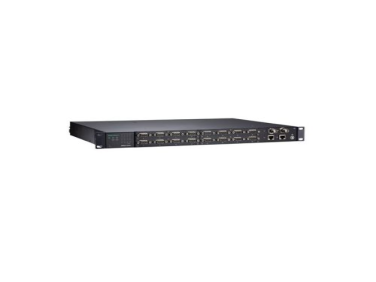



MOXA NPort S9650I Serial Device Server

2452-HW-MAXO-019
Overview
In today’s fast-paced technological landscape, reliable network connectivity for serial devices is paramount. The MOXA NPort S9650I Serial Device Server provide a robust solution for integrating serial devices into your network infrastructure. With an array of advanced features and superior performance, these servers ensure seamless data communication and network efficiency.
| Category | Specification |
|---|---|
| Input/Output Interface | Alarm Contact Channels: 1 A @ 24 VDC (Resistive load) |
| Ethernet Interface | Ports: 4 (10/100BaseT(X) Ports, RJ45 connector) Magnetic Isolation Protection: 1.5 kV (built-in) |
| Optical Fiber | Read more |
| Standards | IEEE 802.1D-2004, IEEE 802.1p, IEEE 802.1Q, IEEE 802.1w, IEEE 802.1X, IEEE 802.3, IEEE 802.3ad, IEEE 802.3u |
| Switch Properties | IGMP Groups: 256 Max. No. of VLANs: 64 Priority Queues: 4 VLAN ID Range: VID 1 to 4094 |
| Ethernet Software Features | Configuration Options: Web Console (HTTP/HTTPS), Windows Utility, Device Search Utility (DSU), MCC Tool, CLI (Serial/Telnet/SSH) Management: Various |
| Windows Real COM Drivers | Windows 95/98/ME/NT/2000, Windows XP/2003/Vista/2008/7/8/8.1/10 (x86/x64), Windows 2008 R2/2012/2012 R2/2016/2019 (x64), Windows Embedded CE 5.0/6.0, Windows XP Embedded |
| Linux Real TTY Drivers | Kernel versions: 2.4.x, 2.6.x, 3.x, 4.x, and 5.x |
| Fixed TTY Drivers | SCO UNIX, SCO OpenServer, UnixWare 7, QNX 4.25, QNX 6, Solaris 10, FreeBSD, AIX 5.x, HP-UX 11i, Mac OS X |
| Android API | Android 3.1.x and later |
| Industrial Protocols | Modbus TCP Server (Slave), DNP3 TCP Outstation |
| Time Management | NTP Server/Client, SNTP, IEEE 1588v2 PTP (hardware-based), IRIG-B |
| MIB | Various MIBs including Bridge MIB, Device Settings MIB, Ethernet-like MIB, MIB-II, P-BRIDGE MIB, Q-BRIDGE MIB, RFC1213, RFC1317, RMON MIB Groups 1, 2, 3, 9, RSTP MIB |
| Redundancy Protocols | RSTP, Turbo Chain, Turbo Ring v1, Turbo Ring v2 |
| Security | HTTPS/SSL, Local Account Accessibility, TACACS+, RADIUS, SSH |
| Serial Interface | Connector: DB9 male No. of Ports: 8 Serial Standards: RS-232, RS-422, RS-485 Operation Modes: Various Baudrate: 50 bps to 921.6 kbps Data Bits: 5, 6, 7, 8 Stop Bits: 1, 1.5, 2 Parity: None, Even, Odd, Space, Mark Flow Control: None, RTS/CTS, XON/XOFF Isolation: 2 kV Surge: 4 kV |
| RS-485 Data Direction Control | ADDC® (automatic data direction control) |
| Pull High/Low Resistor for RS-485 | 1 kilo-ohm, 150 kilo-ohms |
| Terminator for RS-485 | 120 ohms |
| Console Port | RS-232 (TxD, RxD, GND), 10-pin RJ45 (19200, n, 8, 1) |
| Serial Signals | RS-232: TxD, RxD, RTS, CTS, DTR, DSR, DCD, GND RS-422: Tx+, Tx-, Rx+, Rx-, GND RS-485-4w: Tx+, Tx-, Rx+, Rx-, GND RS-485-2w: Data+, Data-, GND |
| DIP Switch Configuration | Ethernet Interface: Turbo Ring, Master, Coupler, Reserved |
| Modbus TCP | Max. No. of Client Connections: 32 Max. No. of Server Connections: 16 |
| DNP3 (Transparent) | Max. No. of Master Connections: 16 Max. No. of Outstation Connections: 32 |
| Reliability | Automatic Reboot Trigger: Built-in WDT Alert Tools: Built-in buzzer and RTC (real-time clock) |
| Power Parameters | No. of Power Inputs: 2 Reverse Polarity Protection: Supported Input Current: 0.65 A @ 100 VAC, 0.47A @ 100 VDC Input Voltage: 110/220 VAC/VDC (100 to 240 VAC, 100 to 250 VDC) |
| Physical Characteristics | Housing: Metal Installation: 19-inch rack mounting Dimensions: 457 x 32 x 330 mm (18 x 1.25 x 12.99 in) Weight: 5.15 kg (11.35 lb) |
| Environmental Limits | Operating Temperature: -40 to 85°C (-40 to 185°F) Storage Temperature (package included): -40 to 85°C (-40 to 185°F) Ambient Relative Humidity: 5 to 95% (non-condensing) |
| Standards and Certifications | EMC: EN 61000-6-2/-6-4 EMI: CISPR 32, FCC Part 15B Class A EMS: Various IEC standards Environmental Testing: Various IEC standards Power Substation: IEC 61850-3, IEEE 1613 Safety: EN 61010-2-201, UL 61010-2-201 Shock: IEC 60068-2-27 Vibration: IEC 60068-2-6, IEC 60068-2-64 Declaration: RoHS, CRoHS, WEEE MTBF Time: 224,670 hrs MTBF Standards: Telcordia SR332 |
High-Speed Connectivity
First and foremost, the NPort S9650I servers provide high-speed data transfer rates, ensuring minimal latency and optimal performance. This feature is crucial for applications requiring real-time data transmission.
Robust Security Protocols
Moreover, security is a top priority with the NPort S9650I. The servers support advanced encryption protocols, such as SSL and SSH, safeguarding your data against unauthorized access and cyber threats.
Versatile Network Integration
Additionally, these device servers offer versatile network integration options. They are compatible with various network protocols, including TCP/IP, UDP, and HTTP, making them suitable for diverse industrial applications.
User-Friendly Interface
Furthermore, the NPort S9650I servers come with a user-friendly interface, simplifying the configuration and management process. The intuitive web console and command line interface (CLI) ensure easy setup and operation.
Enhanced Reliability
Reliability is another significant advantage of the NPort S9650I. Designed for industrial environments, these servers can withstand harsh conditions, including extreme temperatures and high electromagnetic interference.
Comprehensive Monitoring and Management
In addition to their robust design, the NPort S9650I servers offer comprehensive monitoring and management tools. Features such as real-time monitoring, event logging, and alert notifications help maintain network stability and performance.
Applications of MOXA NPort S9650I Serial Device Server
Industrial Automation
The NPort S9650I servers are ideal for industrial automation, where seamless communication between devices is crucial. They ensure reliable data transfer, enabling efficient control and monitoring of automated systems.
Transportation Systems
Moreover, in transportation systems, these device servers facilitate real-time data communication, ensuring the smooth operation of various transportation networks.
Energy Management
Furthermore, the NPort S9650I servers play a vital role in energy management systems, providing reliable data connectivity for monitoring and controlling energy distribution networks.
Building Automation
Additionally, these servers are integral to building automation systems, ensuring efficient communication between sensors, controllers, and other devices.


